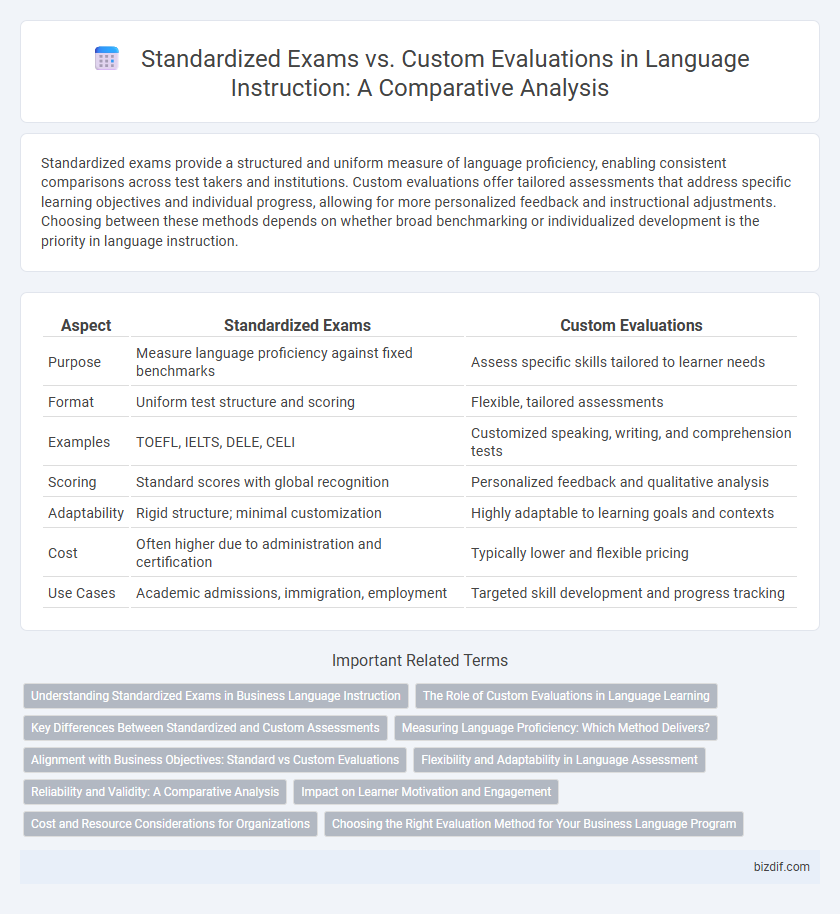Standardized exams provide a structured and uniform measure of language proficiency, enabling consistent comparisons across test takers and institutions. Custom evaluations offer tailored assessments that address specific learning objectives and individual progress, allowing for more personalized feedback and instructional adjustments. Choosing between these methods depends on whether broad benchmarking or individualized development is the priority in language instruction.
Table of Comparison
| Aspect | Standardized Exams | Custom Evaluations |
|---|---|---|
| Purpose | Measure language proficiency against fixed benchmarks | Assess specific skills tailored to learner needs |
| Format | Uniform test structure and scoring | Flexible, tailored assessments |
| Examples | TOEFL, IELTS, DELE, CELI | Customized speaking, writing, and comprehension tests |
| Scoring | Standard scores with global recognition | Personalized feedback and qualitative analysis |
| Adaptability | Rigid structure; minimal customization | Highly adaptable to learning goals and contexts |
| Cost | Often higher due to administration and certification | Typically lower and flexible pricing |
| Use Cases | Academic admissions, immigration, employment | Targeted skill development and progress tracking |
Understanding Standardized Exams in Business Language Instruction
Standardized exams in business language instruction provide a consistent framework to assess language proficiency across diverse learners, enabling objective measurement of skills such as negotiation, presentation, and report writing. These exams often align with global standards like the Common European Framework of Reference for Languages (CEFR), facilitating comparability and credibility in professional communication. Custom evaluations, while tailored to specific organizational needs, may lack the benchmarking value that standardized assessments offer for evaluating business language competencies.
The Role of Custom Evaluations in Language Learning
Custom evaluations in language learning provide tailored feedback that addresses individual learner strengths and weaknesses, enhancing personalized progress tracking. Unlike standardized exams, these assessments adapt to diverse linguistic backgrounds and learning goals, enabling targeted skill improvement. Incorporating dynamic, context-specific tasks, custom evaluations foster deeper language comprehension and practical communication abilities.
Key Differences Between Standardized and Custom Assessments
Standardized exams provide uniform scoring criteria and comparative data across diverse populations, ensuring consistency and reliability in language proficiency measurement. Custom evaluations offer tailored assessment methods that adapt to individual learner needs, focusing on specific skills or contexts relevant to personalized instruction. The key differences lie in scalability and flexibility, where standardized tests emphasize broad applicability and benchmarking, while custom assessments prioritize detailed, contextualized feedback for targeted language development.
Measuring Language Proficiency: Which Method Delivers?
Standardized exams provide a consistent framework for measuring language proficiency, enabling reliable comparisons across diverse populations through validated scoring criteria. Custom evaluations offer tailored assessment aligned with specific learning objectives, capturing nuanced language skills and contextual usage often missed by standardized tests. Balancing standardized metrics and personalized feedback ensures a comprehensive understanding of a learner's language capabilities.
Alignment with Business Objectives: Standard vs Custom Evaluations
Standardized exams provide consistent benchmarks for measuring language proficiency across large groups, ensuring comparability and efficiency. Custom evaluations align more closely with specific business objectives by tailoring assessments to the unique linguistic demands of a particular role or industry. This targeted approach enhances relevance, directly supporting talent development and operational performance goals.
Flexibility and Adaptability in Language Assessment
Standardized exams provide consistent metrics for language proficiency but often lack flexibility to address individual learner needs and diverse linguistic backgrounds. Custom evaluations allow educators to adapt assessment methods, formats, and content to better reflect a student's unique language abilities and learning context. Emphasizing adaptability in language assessment fosters more accurate measurement of communicative competence and supports personalized instructional strategies.
Reliability and Validity: A Comparative Analysis
Standardized exams offer high reliability through consistent administration and scoring, ensuring comparable results across diverse populations. Custom evaluations enhance validity by tailoring assessments to specific learning objectives and individual language proficiency levels. Balancing these factors is essential for effective language instruction assessment, as reliability ensures consistency while validity guarantees relevance and accuracy.
Impact on Learner Motivation and Engagement
Standardized exams provide clear benchmarks, fostering competitive motivation but may limit personalization that addresses individual strengths. Custom evaluations adapt to learners' unique progress and interests, enhancing intrinsic motivation and sustained engagement through tailored feedback. Research indicates personalized assessments increase learner confidence, leading to deeper language acquisition compared to uniform standardized testing.
Cost and Resource Considerations for Organizations
Standardized exams often require significant upfront costs for licensing, training, and infrastructure, making them a substantial investment for organizations. Custom evaluations, while potentially less expensive initially, demand ongoing resources for development, calibration, and expert involvement to maintain reliability and validity. Organizations must weigh long-term sustainability against immediate expenditures, balancing financial constraints with the need for tailored assessment accuracy.
Choosing the Right Evaluation Method for Your Business Language Program
Standardized exams offer consistent benchmarks for assessing language proficiency, ensuring comparability across candidates and facilitating clear communication of skills to international stakeholders. Custom evaluations allow businesses to tailor assessments to specific industry terminology and workplace scenarios, providing more relevant insights into practical language use and employee readiness. Selecting the appropriate evaluation method depends on your organization's goals, industry requirements, and the desired balance between standardized measurement and contextual relevance.
Standardized exams vs Custom evaluations Infographic

 bizdif.com
bizdif.com